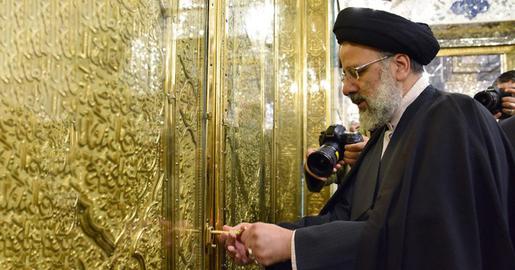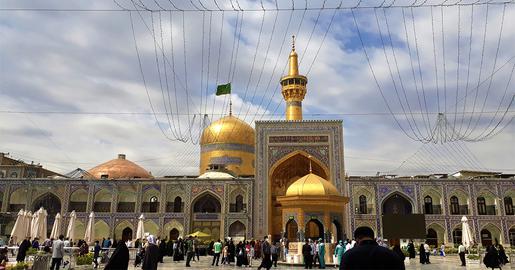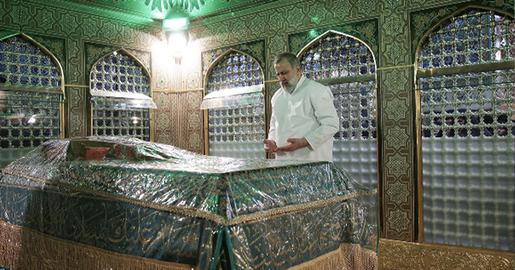Ebrahim Raisi oversaw Astan Quds Razavi from February 2016 to March 2020.
This institution, often referred to as the financial empire of the leader of the Islamic Republic, is known for its vast but opaque economic and financial activities, which are not subject to independent oversight.
Astan Quds Razavi's financial network, shrouded in secrecy, dominates its substantial revenues.
It leverages state resources in sectors ranging from oil and gas to pharmaceuticals, agriculture, and car manufacturing.
Despite this significant income, during his presidency, Raisi opted to increase taxes on workers, employees, and businesses by 50 to 70 per cent to address the government budget deficit.
However, he did not advocate for taxing Astan Quds Razavi.
The leadership of Astan Quds Razavi in Mashhad has been characterized by claims of superficiality and showmanship, with assertions of increasing profitability, suspension of construction activities, political maneuvering, and the use of financial and credit resources for election campaigns.
There has also been a tendency to deflect and project in response to questions and criticisms.
Before the 1979 revolution, Astan Quds Razavi's activities were limited to collecting offerings from the public and distributing them among the needy.
Its endowment properties were mostly the land surrounding the tomb of the 8th Shia Imam and some nearby shops.
However, after the revolution, Astan Quds Razavi's operations expanded significantly, transforming it into the largest waqf collection in the Islamic world.
Its growth in endowment properties and economic activities has earned it the title of the financial empire of Astan Quds, with a turnover reaching billions of dollars.
Astan Quds Razavi is now active in various economic sectors, including civil and construction, finance and trade, agriculture and animal husbandry, food and medicine, industry and mining, automotive, energy and oil and gas, information and communication technology, education, culture and media, and pharmaceuticals.
More than half of the land in Mashhad is owned by Astan Quds and is leased out, with a significant portion of transaction prices from property sales going to the institution.
Its endowment properties are not limited to Mashhad; they are spread across Khorasan Razavi, North and South Khorasan, Tehran, Qazvin, East and West Azarbaijan, Isfahan, Yazd, Kerman, Mazandaran, Fars, Golestan, Gilan, Semnan, Khuzestan, as well as in Afghanistan and Azerbaijan.
According to the latest statistics, Astan Quds has over 350,000 tenants in Mashhad alone.
The issue of Astan Quds Razavi's tax obligations has been a point of contention.
Critics argue that, given its extensive use of government facilities and preferential currency, it should be required to pay taxes on its significant earnings from factories, companies, affiliated institutions, and agricultural holdings.
Despite its substantial profits, the institution has faced criticism for not paying taxes, which is seen as an unjust advantage.
Ebrahim Raisi responded to criticisms by asserting, "They don't tax people's donations."
As the eighth president of the Islamic Republic, Raisi is known for raising the tax rate in budget bills.
He presented a controversial justification for Astan Quds's tax exemption, stating, "We are helping the poor with 10 times the money we are going to pay in taxes."
In a speech at Mashhad University, he added, "God forbids those who created the doubt of the Astan Quds tax in their minds."
Instrumental and Political Use of Religious Figures
Critics have accused Raisi of using the 8th Imam of the Shia for political purposes, citing actions such as the distribution of free bags of flour and rice from Astan Quds in villages during elections.
Some claim that tens of billions were extravagantly spent on election campaigns from Astan Quds funds. Raisi has denied these accusations.
Claims of Profitability in Astan Quds Razavi
Raisi has repeatedly claimed to have turned loss-making companies within Astan Quds into profitable entities, increasing work efficiency and profitability.
However, without access to Astan Quds's financial statements, which are not subject to any auditing body, it is difficult to verify these claims.
On the contrary, the increase in Astan Quds's debt to the banking network and the decrease in income from affiliated companies suggest the opposite of Raisi's assertions.
Special Private Protection Unit
Raisi established the Astan Quds Razavi property protection unit, an independent police force, arguing that the property and endowment places were being stolen by malicious individuals.
This force, which operates independently of other military organs, has been perceived as a private army for Astan Quds Razavi.
The autonomy and power of Astan Quds guardians have caused dissatisfaction, particularly in Mashhad.
This power extends to canceling and preventing concerts and film screenings in Khorasan provinces, even those officially licensed by the government or the Ministry of Culture and Islamic Guidance.
Notable cancellations include Salar Aghili's concert in Sabzevar and the prevention of Shahram Nazari and Kihan Kalhor's concert in Neishabur.
Private TV Channel for Astan Quds Razavi
As the head of Astan Quds Razavi, Raisi initiated the launch of the "Haram Razavi" television channel, dedicated to broadcasting live images of the tomb of the 8th Shia Imam continuously.
This move aimed to enhance the religious and cultural influence of Astan Quds.
In addition to the TV channel, Raisi also established a comprehensive public communication service center and launched the national 138 telephone system to facilitate public engagement with Astan Quds.
Attempts to Establish a Private Bank
Raisi planned to establish a private bank for Astan Quds Razavi.
The objective was to create a financial institution where the financial transactions of affiliated companies or sub-groups of Astan Quds Razavi could not be monitored or investigated.
However, he failed to realize this plan.
Five months after assuming the presidency, Raisi criticized the government's lack of cooperation, stating: "Today, the ground has been laid for the establishment of an usury-free bank."
Financial Corruption Scandals
Despite Raisi's anti-corruption stance, Astan Quds Razavi was embroiled in a financial scandal.
Earlier this year, documents revealed a $22 million embezzlement related to the import of car tyres.
In 2019, Razavi's supply chain management paid $80 million in government currency for importing 200,000 tyres, but there was a $22 million deficit.
The individuals involved in this embezzlement have since been appointed to various positions in Raisi's government.
For instance, Alireza Peyman Pak, who was the manager of the Razavi supply chain company, acquired key positions in the government and currently oversees its executive-economic management.
Governance and Taxation Contradictions
Comparing Raisi's administration of Astan Quds Razavi with his presidency reveals similarities in his governance style.
The most notable contradiction is his stance on taxation.
While his government collects taxes from the public, Astan Quds Razavi remains resistant to tax collection.























comments